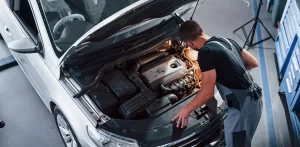Understanding a car’s history is essential for any potential buyer. It reveals important details about past accidents, ownership changes, and maintenance records. Such insights can greatly influence purchasing decisions. By identifying red flags like inconsistent mileage or salvage titles, buyers can avoid costly mistakes. This proactive approach not only guarantees a sound investment but also promotes long-term peace of mind. What specific steps can one take to uncover this crucial information?
Key Takeaways
- A detailed vehicle history report reveals past accidents, helping you avoid costly repairs and maintaining your investment’s value.
- Checking ownership history minimizes risks associated with multiple owners, indicating potential unresolved issues that can affect the vehicle’s reliability.
- Identifying title discrepancies through history checks prevents legal complications and financial losses, ensuring a clear and secure purchase.
- Monitoring maintenance records allows you to gauge the car’s upkeep, predicting future repair costs and preventing unexpected expenses.
- Awareness of red flags, such as odometer tampering or salvage titles, protects your investment and provides peace of mind during the buying process.
The Importance of Knowing a Car’s Background
Understanding a car’s background is essential for potential buyers, as it provides valuable insights into the vehicle’s history and condition. Many individuals seek reassurance in their investments, and knowing a car’s past can greatly enhance their confidence. A thorough understanding of a vehicle’s background reveals past accidents, maintenance records, and ownership history, which can influence its performance and value. In addition, prospective buyers who learn how to check a car’s history can identify any red flags that may indicate hidden problems or potential liabilities. This knowledge not only protects their financial investment but also contributes to their overall peace of mind. Ultimately, being informed fosters a sense of belonging within a community of responsible car owners who prioritize transparency and trustworthiness.
Steps to Check a Car’s History
Before making a significant investment in a vehicle, potential buyers should familiarize themselves with the essential steps to check a car’s history. First, gather the vehicle identification number (VIN), as it serves as the key to revealing detailed records. Next, utilize reputable online services that offer thorough vehicle history reports, ensuring they include data on accidents, title status, and mileage verification. Additionally, reviewing maintenance records can provide insights into the car’s upkeep. It is also beneficial to consult local authorities for any reported thefts or unreported issues. By systematically following these steps, buyers can make informed decisions, enhancing their sense of belonging within the community of responsible car owners who prioritize safety and reliability.
Common Red Flags to Look For
After gathering the necessary information to check a car’s history, buyers should remain vigilant for common red flags that may indicate underlying issues. Understanding these signs can enhance their confidence in making a purchase.
Potential red flags include:
- Inconsistent mileage: Discrepancies in odometer readings may suggest tampering.
- Multiple owners: A frequent change in ownership can hint at unresolved problems.
- Salvage title: This indicates the car has been greatly damaged in the past.
- Unreported accidents: A clean history report might not reveal all incidents.
- Extended service records: Frequent repairs can suggest persistent mechanical issues.
Utilizing Online Resources for Vehicle History
While many buyers may feel overwhelmed by the process of checking a car’s history, utilizing online resources can greatly simplify this task. Numerous websites offer extensive vehicle history reports that compile essential information, such as ownership records, accident history, and title status. These platforms typically require a Vehicle Identification Number (VIN) to generate a detailed report, providing a clear picture of the car’s past. In addition, online forums and community reviews can offer personal insights from previous owners, helping potential buyers gauge the vehicle’s reliability. By leveraging these resources, buyers can make informed decisions, ensuring they feel confident in their investment. Ultimately, harnessing online tools fosters a sense of belonging to a community of savvy, educated consumers.
How a Detailed History Report Can Save You Money
A thorough vehicle history report can greatly impact a buyer’s financial decision-making when purchasing a used car. By providing essential insights, it helps buyers avoid costly pitfalls. Here are key ways a detailed history report can save money:
- Identifies past accidents: Understanding a vehicle’s accident history can prevent future repair costs.
- Reveals title issues: Ensuring a clear title avoids potential legal troubles and financial losses.
- Uncovers mileage discrepancies: Confirming accurate mileage protects against overpaying for a vehicle.
- Highlights service records: Access to maintenance history can indicate the likelihood of future expenses.
- Sheds light on ownership history: Knowing previous owners can inform about potential wear and tear.
Ultimately, learning how to check a car’s history is an essential step in safeguarding one’s financial investment.
Frequently Asked Questions
Can I Check a Car’s History for Free?
Yes, individuals can check a car’s history for free through various online services that provide basic information. However, accessing detailed reports often requires a fee, which may be worth the investment for thorough insights.
How Long Does a Vehicle History Report Take to Generate?
A vehicle history report typically generates within minutes, depending on the service used. Most online platforms provide instant access to information, allowing potential buyers to make informed decisions quickly and efficiently about their prospective purchases.
Are There Different Types of Vehicle History Reports?
Yes, there are various types of vehicle history reports available. These reports can include details on accidents, ownership history, title status, and service records, providing essential insights for potential buyers to make informed decisions.
What Details Are Included in a Typical Car History Report?
A typical car history report includes details such as title status, accident history, service records, odometer readings, previous ownership, and any recalls. This thorough information helps buyers make informed decisions about potential vehicle purchases.
Can I Check a Car’s History by Its License Plate?
Yes, a car’s history can often be checked using its license plate. Various online services and tools allow users to access detailed reports, providing insights into the vehicle’s past, including accidents and title information.
Conclusion
In summary, checking a car’s history is an essential step in safeguarding one’s investment and ensuring peace of mind. By understanding a vehicle’s background, prospective buyers can identify potential issues and avoid costly surprises. Utilizing online resources and recognizing common red flags equips consumers with the knowledge needed for informed decision-making. Ultimately, a thorough history report not only enhances confidence in the purchase but also contributes to long-term satisfaction and financial security in vehicle ownership.
You May Also Like To Read:


